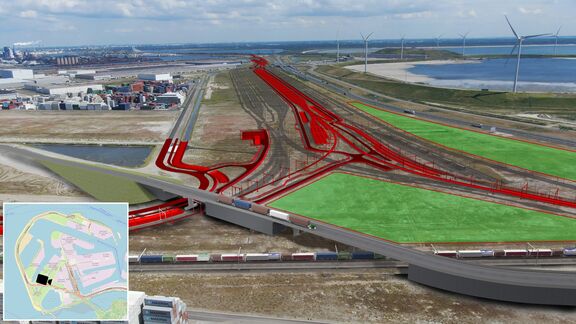
Start of construction Maasvlakte-Zuid railway yard
In collaboration with ProRail, the Port of Rotterdam Authority is realising the first phase of the Maasvlakte-Zuid railway yard (EMZ) in the period 2023-2027. This phase includes the construction of six tracks (bundle 1) and several connections to the existing rail infrastructure.
The railway yard will be built in phases and connect to the outer contour APMT and RWG and to the eastern bundle of tracks at the Slufter node. The new railway yard is needed to facilitate the increasing rail freight traffic from Maasvlakte to the European hinterland. An extensive study was carried out to find the best solution. The study was made possible in part due to CEF funding from the European Commission.

Construction of bundle 1
The contract for the construction of bundle 1 has been awarded to Swietelsky Rail Benelux B.V. This contractor has started work on the preparations and design of the bundle. Construction at the site will commence in 2025, and will be completed by 2027. In 2026, the largest railway works will be carried out. After the test phase in mid-2027, ProRail will commission and operate the railway yard. Further expansion with extra bundles is dependent on the actual growth of rail freight transport on the Maasvlakte.
Underground structures
The new railway node will cross the existing pipeline strip at several points. In anticipation of the aforementioned works, existing cables and pipelines have been rerouted so that these works do not interfere with the EMZ railway yard to be realised.

Concrete underground structures have also been constructed. Where the routes cross rail infrastructure, facilities have been placed. These structures ensure that future cable and pipeline routes are 'covered'. This will reduce disruptions 'overground'; a pipe duct will provide a route under the track. The underground structures will enable pipelines for new energy transition projects to be laid under railway lines without causing disruptions.

TTrain-free period
On the east side of the yard, the underground structure for the future cables and pipes will be constructed at the same time as the track construction. This will include a train-free period during the Whitsun weekend of 2026, as the existing track needs to be crossed to the Locomotive Workshop Rotterdam (LWR).
Phasing
Construction of the Maasvlakte-Zuid railway yard bundle 1 will take place according to the following schedule:
| Phases | Start |
|---|---|
| Final order for construction of railway yard | 4 October 2024 |
| Finalisation of design by contractor and start of construction | Q2 2025 |
| Peak of railway construction | 2026 |
| Completion and test phase | Q2 2027 |
| Commissioning of track bundle 1 by ProRail | Q3 2027 |
Local accessibility
During realisation, any nuisance or restrictions for current infrastructure (road, rail, cables and pipelines) will be kept to a minimum as far as possible.
BAchieving climate goals
The construction of the EMZ is part of the Port of Rotterdam Authority’s efforts to facilitate rail freight transport. Rail freight transport produces less carbon, nitrogen and particulate emissions than road transport. This is in line with the climate goals of the EU Green Deal, which aims to reduce transport emissions by 55% by 2030 and 90% by 2050. The development of the EMZ will help the Port of Rotterdam Authority reduce CO₂ emissions from hinterland and continental transport by 30% by 2030, in accordance with the Climate Agreement. Thanks to the railway yard, the Port of Rotterdam Authority expects to run an additional 6,750 trains a year between the Maasvlakte and the hinterland, replacing 675,000 truck trips a year.
Landscape integration
Economic progress is important, but it should never be at the expense of nature, the environment and the habitat of the port industrial complex. Industry and nature coexist in the port of Rotterdam. Within the EMZ project area, we are constructing a dune landscape to add value to the environment and stimulate biodiversity. We are also creating a wetland just outside the project area. This will provide a variety of environmental features, such as mossy vegetation, water, shallow natural banks and dunes with buckthorn thickets. The ideal habitat for birds, amphibians and insects.
